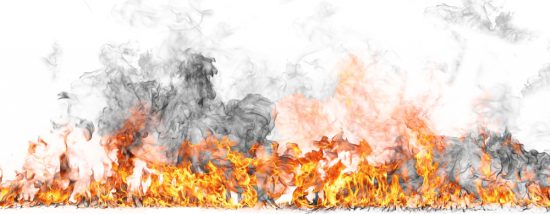Protecting taxpayer interests in the fire liability fight
By Jon Coupal

One of the most contentious political battles currently being waged in Sacramento during the final two weeks of the legislative session is over the extent to which investor-owned utilities, such as Pacific Gas & Electric, should be held liable and have to compensate property owners for the damage inflicted by the horrendous wildfires that are still burning across the state. Average California taxpayers and homeowners probably sense this is a big deal because of extensive media coverage, but may not know what to think about it.
Here’s what’s going on.
First, there is little dispute that the number of wildfires and their intensity has increased dramatically in recent years. Investor-owned utilities, including PG&E as well as San Diego Gas & Electric, have been forced into big legal settlements because many fires were allegedly caused by electrical wires or other equipment. The utilities, however, have attempted to shift some of the blame to natural causes such as climate change, which they argue produces the conditions for more catastrophic fires. (More recently, blame has also been placed at California’s mismanagement of public lands, which is undoubtedly a contributing cause).
Determining liability for wildfires is such a hot issue — no pun intended — because of the amount of money involved. San Diego Gas & Electric was facing more than 2,500 lawsuits and thus paid $2.4 billion in settlements for its role in three 2007 fires that burned over 1,500 homes, took human lives and burned 368,316 acres in San Diego County. Fires still burning as this column is being written have inflicted even greater damage and loss of life.
These damages have rocked PG&E and SDG&E. According to a January blog post from the Energy Institute at Hass, California utilities lost $20 billion in market capitalization after last year’s fires.
In an effort to lessen their liability, the utilities say a constitutional doctrine called inverse condemnation has compelled them to settle lawsuits from property owners, firefighting agencies and local governments. They believe the doctrine entitles them to recoup some of the expenses by raising rates, but California’s Public Utility Commission has balked.
Although the utilities’ efforts to offload some of their liability for fire damage is understandable, taxpayer advocates are opposing the shift as it diminishes their own property rights. The Howard Jarvis Taxpayers Association views limited taxation on property as a natural extension of property rights generally. For example, following the infamous Kelo v. New London decision by the United States Supreme Court allowing the use of eminent domain for private-to-private transfers of property, HJTA fought for both a state constitutional, as well as statutory, prohibition of those takings. Other property-rights issues of major concern to taxpayer advocates include the attempt to expand rent control in California and ensuring that just compensation is paid to property owners for traditional exercises of eminent domain, especially for boondoggle projects like California’s High Speed Rail project.
In weighing whether investor-owned utilities should be able to shift the cost of fire damage away from their shareholders and onto the ratepayers, property owners or government, it is important to realize that they have special rights and powers not enjoyed by other businesses. They are granted monopolistic markets and, more importantly for this discussion, they have the power of eminent domain. In short, utilities have the power to take the private property of others for rights of way or easements.
Because utilities have the power to take other private property, the owners of those other properties have the right to commence “inverse condemnation” suits against the utilities. Historically, inverse condemnation allows private property owners in situations of eminent domain to seek fair market value for their property. Taxpayers facing the harm of having their property taken should not be exposed to further financial difficulty because of enhanced wildfire liability which is not their fault.
Due to both the severity of the damage caused from wildfires as well as the huge amounts of money involved, the investor-owned utilities are making a full court press – with the assistance of Governor Brown – to fashion some sort of legislative relief which (they claim) is necessary for them to avoid bankruptcy. But taxpayers, insurance companies and consumer organizations have pushed back and legislators from both parties are nervous because they don’t want to be perceived as bailing out big utilities.
Of all the reasons to oppose any statute limiting inverse condemnation actions against utilities perhaps the best is that this issue should be resolved by the courts. There are at least three currently active lawsuits in our court system waiting to address the topics of inverse condemnation and liability. Let’s leave it to the judiciary whether to alter established constitutional principles related to exercises of eminent domain.
Jon Coupal is president of the Howard Jarvis Taxpayers Association.




